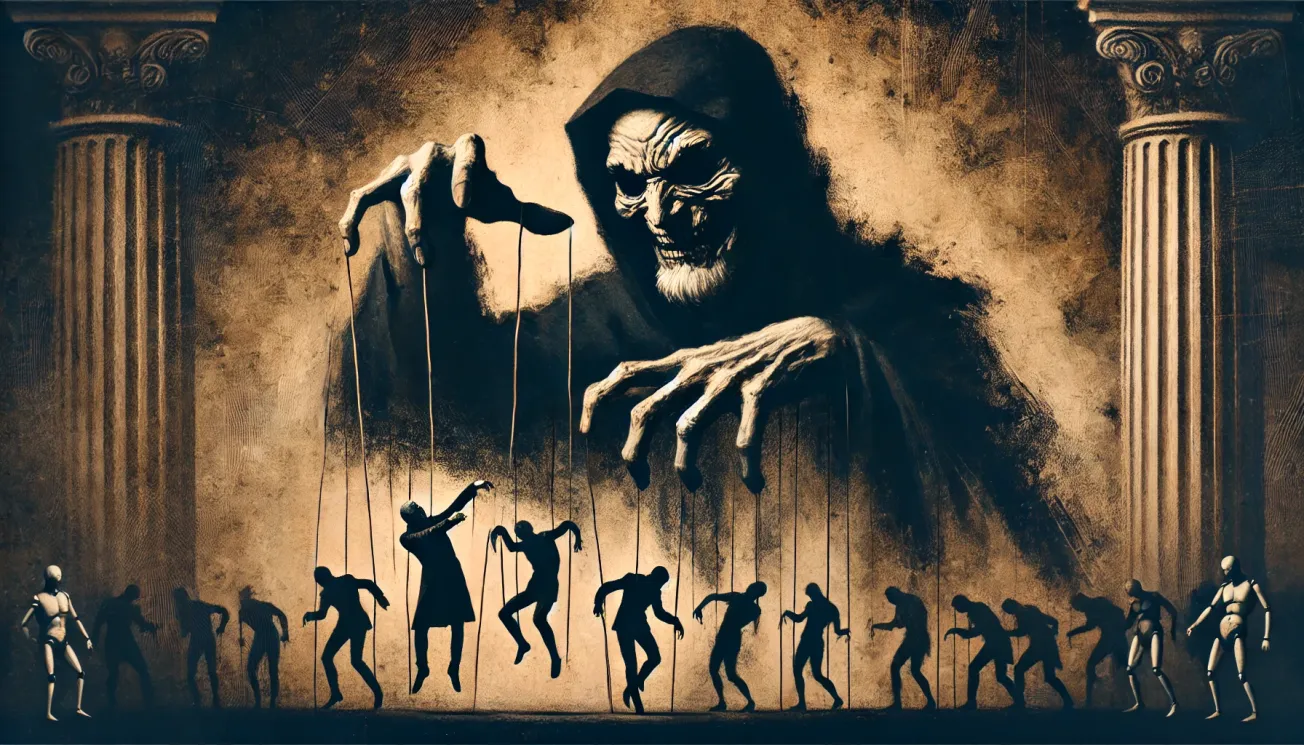Ever wondered how regular people end up doing awful things? Like, really terrible stuff—violence, cruelty, even genocide? It’s not random. Lies, Fear, and Blind Loyalty can make normal people commit atrocities. But how is that possible?
It often starts with believing something that doesn’t even make sense.
François-Marie Arouet (21 November 1694 – 30 May 1778), known by Voltaire, said it best:
“Those who can make you believe absurdities, can make you commit atrocities.”
He meant that when people swallow ridiculous ideas, they can be tricked into doing horrible acts, thinking it’s okay—or even good. History backs this up, and it’s still a thing today. Let’s unpack this. It’s heavy, but it matters.
When Crazy Ideas Led to Terrible Actions
This isn’t just a theory—it’s happened over and over. Here are some times when absurd beliefs turned people into monsters:
- Ancient Greece (Melos, 416 BC): Athens, this big-deal democratic city, attacked a tiny island called Melos. They killed all the men and enslaved the women and kids. Why? They believed their power gave them the right. “The strong do what they can, the weak suffer what they must,” they said. It’s absurd to think might equals right, but they bought it—and did something awful.
- Socrates’ Death (399 BC): Athens executed their own philosopher, Socrates, for “corrupting the youth” with his questions. Really, they were scared after wars and plagues, so they blamed him. They believed his ideas threatened the gods and the city. Total nonsense, but it got him killed.
- Roman Empire: Romans took over tons of places, killing and enslaving people. They said it was to “civilize” them. Bringing peace and law? Sure, but they wiped out whole cities like Carthage. They believed their greatness justified it—absurd, yet it fueled atrocities.
- The Inquisition: The Church in medieval Europe tortured and burned people for “heresy”—thinking differently. They believed wrong ideas could doom everyone’s souls. It’s wild to think torturing someone saves them, but they did it, convinced it was holy.
- Nazi Germany: Hitler convinced people Jews caused all their problems—economic crashes, wars, everything. A total lie, but millions believed it. That belief led to the Holocaust—six million Jews murdered. Ordinary folks turned killers because of this absurd myth.
- Rwanda (1994): Hutu leaders said Tutsis were “cockroaches” plotting to kill them. Another lie. In 100 days, 800,000 Tutsis were hacked to death by neighbors who believed the propaganda. Fear and nonsense drove it.
These aren’t one-offs. From ancient times to now, absurd beliefs—like “this group is evil” or “we’re superior”—keep sparking atrocities. How do people fall for it?
How Leaders Trick People Into Believing Nonsense
Leaders don’t just snap their fingers and make this happen. They use tricks—stuff that messes with your head. Here’s how they pull it off:
- Propaganda and Fear
They blast lies everywhere—radio, papers, now social media. Repeat something enough, it sticks. In Rwanda, radio called Tutsis “cockroaches” daily. People got scared and believed it. Fear’s a big one: “Do this, or we’re all doomed!” It shuts off your brain and makes you trust the loudest voice.
1.Obedience and Following the Crowd
People listen to bosses. An experiment once showed folks shocking someone just because a scientist said so. They didn’t want to, but they did it anyway. In Nazi Germany, soldiers followed orders to kill, saying, “It’s my job.” And if everyone’s doing it? You join in. No one wants to be the odd one out.
2.Big Ideas That Twist Right and Wrong
Leaders push ideologies—huge beliefs like “our race is best” or “God wants this.” Nazis said killing Jews made the world “pure.” The Inquisition said torture saved souls. These ideas flip morality: bad becomes good if it’s for the “cause.” It’s absurd, but it works.
3.Blaming Someone Else
Things suck? Point at a group and say, “It’s their fault!” Nazis blamed Jews for money problems. Romans blamed Christians for a fire. It’s easy to hate when you’re mad and scared. Leaders make you believe that group’s the enemy, and hurting them fixes everything.
4.God or Country
They say, “God demands it,” or “It’s for the nation!” ISIS tells fighters killing is holy. Colonizers said they were “civilizing” people while enslaving them. It feels noble—patriotic or sacred—so you ignore how messed up it is.
These tricks tap into fear, loyalty, and wanting to fit in. Once you believe the nonsense, doing awful things doesn’t seem so bad. But can we stop it?
How Do We Keep This From Happening?
I wish I had a perfect fix, but it’s tricky. We don’t know everything, and new problems pop up. Still, here’s what might help:
1.Learn to Think for Yourself
School should teach you to question stuff, not just memorize. History—like these atrocities—shows what happens when people don’t. If you can spot a lie and care about others, it’s harder to hate. But not everyone gets that chance, and it takes time.
2.Don’t Trust Everything Online
Today, lies spread fast on TikTok or X. Check who’s talking and why. Is there proof? Media literacy—knowing what’s real—can stop you from falling for propaganda. It’s on us to dig deeper, but it’s tough when everything’s so loud.
3.Rules That Stop Power Grabs
Governments with balance—like courts and free speech—can keep one person from going too far. Laws against hate talk help too. But if leaders ignore them? Or if people don’t care? It’s not enough.
4.Build a Kinder World
If we value everyone’s rights and hear their stories, it’s harder to demonize them. Germany has Holocaust memorials to say, “Never again.” Art and humor can mock dumb ideas too. Still, hate can drown that out if we’re not loud enough.
5.Catch It Early
Watch for hate speech or blame games. Groups can call it out—radio shows in Rwanda now push peace instead of division. But if no one acts fast, it’s too late.
None of this is foolproof. People still get fooled. I don’t know all the answers—maybe no one does. But doing nothing isn’t an option.
Then What?
Voltaire nailed it: absurd beliefs can lead to atrocities. It’s not just old news—it’s now, with misinformation everywhere. We’ve seen how it works: lies, fear, and blind loyalty turn regular people into tools of horror. We can fight it with smarts, skepticism, and kindness, but it’s not guaranteed.
So, next time you hear someone say a group’s the problem or we need to act extreme, pause. Ask: Is this true? Does it add up? If it’s shaky, call it out. I’m no expert, just someone trying to figure it out with you.
But.. History’s clear—when we let nonsense slide, bad things follow. Let’s not be the ones who fall for it.
This is a short version of a much longer research post:







